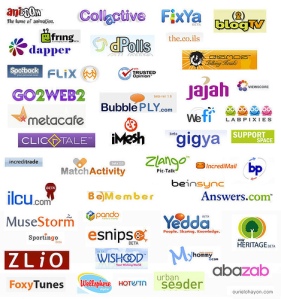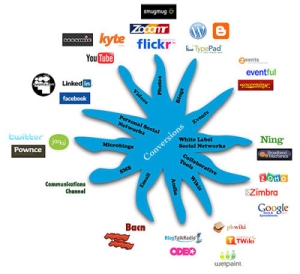Archive
Trends, Ideas and Opportunities for a startup

In my last three posts I have deliberate focused on startup ideas because I think the world deserves to know about the ideas I have been thinking about. I believe that an idea has no value if is not being implemented or has not been implemented. As I write this post, I am going through a customer discovery phase of my new startup idea. I am trying as much as possible to contact at least five companies who share the pain I have discovered. The primary research will prove my assumptions right or wrong. I read about so many ideas and predictions of new trends and opportunities for startup by popular bloggers, and I am convinced beyond reasonable doubt that in as much as there are good ideas, the real value is in the implementation. If somebody believes in the ideas I blog about he or she can implement them and I will be happy to be a beta tester. In the mean time I am trying out few once from the large pool of startup ideas I have. I will keep you posted with ideas in every post. You are welcome to share your comments on the ideas I blog about. In the mean time check out Whats Next After Web 2.0 and Mobile Opportunities For Startups and listen to what Eric Schmidt has to say about where the opportunities are in the future
Startup Ideas from 2 Startup Industries

A lot of startups exist as a business with contributions from the public to gather content. Startups like Digg , Reddit , stumbleUpon and Wikipedia have been able to create something useful that attracted users who ended up providing content for these sites. Others have created platforms that allow innovation and creativity by leveraging on architecture of participation.
1. Open Innovation
The first idea revolves around Open Innovation. Products are listed under three categories. Platforms that allow peer to peer (p2p) product creation .There are sites that initiated by corporate organizations and last but not the least is public sector peer production for institutions and agencies. The list of ideas and products can be found here: Open Innovation Ideas and Online Crowd Powered Ideas and startups.
2. Enterprise 2.0
A lot of applications have been built around the web 2.0 buzz. Companies have always been concerned about how their data can be safe with a startup that has products on a remote server and sometimes the service is even still in beta stage, but these startups expect enterprises to sign on and pay for particular service. The greatest concern has always been security. But some companies have are doing great and new companies are springing up every day in the enterprise space. Kart has identified opportunities in four areas with great potential. Enterprise 2.0 Opportunities
Consumer Startup Ideas

I have always believed that succeeding with a consumer application in the internet is very difficult.Even though i have explored a coupled of them I still think consumer applications takes time to get to main stream.But If the idea is mission critical and solves the pain everybody has, you are likey to make it mainstream.There are just too many consumer applications out there.Consumers have so much choice that the least frustration they go through on your application,they are bound to leave without thinking twice about it. Tim Oreilly urges Web.2.0 firms to solve real world problems He believes that the world gas been bedeviled with too many web applications that are not making impact in the world.He thinks its high time somebody concentrated on ideas that solve global problems that has the potential to impact somebody’s life positively.He says most startup ideas are concentrated on leisure and entertainment.I have my Own opinion on that.
Anyway think about these Ideas and let me know what you think:
• A Market place for Volunteers/charitable Organizations
There should a marketplace of sorts where these information can be assessed and volunteers can be matched to organizations looking for them. Moreover, volunteers should be able to share their stories, be they words, images or videos such that these stories can be told to the rest of the community. In fact, volunteers and organizations can even rate each other to create some form of reputation mechanisms.
• Social Commerce
A startup that will use TipJoy’s API to create a service for online stores to allow their customers to purchase their goods via Twitter. I will offer discounts to twitter purchasers that will agree to broadcast their purchase to followers. I will allow users the option of making that broadcast.
• “We are all stuck in jobs we hate. How do you create products that help people do what they are passionate about and enjoy a healthy financial income? Empowering people and giving them a means to an alternate lifestyle that people love?”
• search engine for (Amazon.com’s MP3 library, iTunes and AppStore and Imeem)
Sign up as an affiliate of Apple through LinkShare. Then I get access to Apple’s 6.5mm song data feed (download data feed spec doc), you have to pay an a mount to LinkShare (which gives you access to product feeds from many of their merchants). You’ll then earn a percentage of any sales that result from your iTunes or Appstore search engine.
10 Marketing 2.0 Commandments.

• By knowing the lifetime value of your users, you know exactly how much you can pay to acquire new users with an acceptable profit margin
• andrewchenblog
• dig into target customer’s need for the solution, real addressable market size and segments and any existing current demand for the category
•First Penny
•predictablyirrational
• focus on developing marketing skills that will always remain relevant. These include things like marketing psychology, diffusion of innovation, company building, customer research methods, persuasive website architecture, actionable marketing metrics…
marketing-plan-for-web-20-startups-presentation
• Success is based on a combination of access to financing, market need, exceptional product and marketing execution, tenacity, and let’s face it – luck.
• Effective customer development… By figuring out who needs your product/service, why they need it, what constitutes a gratifying experience with the product/service and getting more of the right type of people to this gratifying experience (highlighting the right benefits and reducing barriers) social media can become a powerful driver for your business too.
Startup Business Ideas

I have been looking into ideas that can possibly be turned into a company if the market analysis are done right.These are some of the ideas I have been thinking about.
•“There are plenty of customers and business partners that are willing, and even anxious, to tell a business exactly what they need, how to improve a product, or even become involved with the design and innovation process in order to contribute their experience and requirements. It is through empowering the people and letting their contributions be heard that the great advances are made.”
• Diskaunt
Online deals and discount provider which lists all available shopping discounts. Discounts on flight, hotel, bus booking, credit card, flowers, cakes, electronics, mobiles, laptops, computers books and cloths in a geographical area of customers’ preference.
• SocialShop
Social Commerce (online shopping). It helps shoppers interact and share before making decisions to purchase. Add feature that allow shoppers to create wish list with price quotations and receive sms when the price matches their wish list and in a geographic area of choice.
• Myrr
Borrow books online and add to your profile and read for a period within a period. Pay based on number of books borrowed.
You can also think around these:
• Ideas that could become new companies
• Ideas that could become new products for existing companies (mine or someone else’s)
• Ideas that could become great new features for existing products
• Ideas that could improve existing features of existing products
TechCrunch Network Search Engine
I have been using techcrunch a lot to find out about technology news and emerging startups on the internet.Recently I stumbled upon the TechCrunch Network Search Engine .Its a great tool that has helped me tremendously.I have been looking for a site with startup directory like what techcrunch provides.All the startups featured on both TechCrunch and Crunchbase are presented in a way that makes it possible to track what they do easily. What makes it very useful fro me is that I type particular industry and it returns all the startups that are featured under it in a perfect way.Its especially useful if you are conducting research under competitive analysis.
15 Startup Commandments
1. Your idea isn’t new. Pick an idea; at least 50 other people have thought of it. Get over your stunning brilliance and realize that execution matters more.
2. Stealth startups suck. You’re not working on the Manhattan Project, Einstein. Get something out as quickly as possible and promote the hell out of it.
3. If you don’t have scaling problems, you’re not growing fast enough.
4. If you’re successful, people will try to take advantage of you. Hope that you’re in that position, and hope that you’re smart enough to not fall for it.
5. People will tell you they know more than you do. If that’s really the case, you shouldn’t be doing your startup.
6. Your competition will inflate their numbers. Take any startup traffic number and slash it in half. At least.
7. Perfection is the enemy of good enough. Leonardo could paint the Mona Lisa only once. You, Bob Ross, can push a bug release every 5 minutes because you were at least smart enough to do a web app.
8. The size of your startup is not a reflection of your manhood. More employees does not make you more of a man (or woman as the case may be).
9. You don’t need business development people. If you’re successful, companies will come to you. The deals will still be distractions and not worth doing, but at least you’re not spending any effort trying to get them.
10. You have to be wrong in the head to start a company. But we have all the fun.
11. Starting a company will teach you what it’s like to be a manic depressive. They, at least, can take medication.
12. Your startup isn’t succeeding? You have two options: go home with your tail between your legs or do something about it. What’s it going to be?
13. If you don’t pay attention to your competition, they will turn out to be geniuses and will crush you. If you do pay attention to them, they will turn out to be idiots and you will have wasted your time. Which would you prefer?
14. Startups are not a democracy. Want a democracy? Go run for class president, Bueller.
15. You’re doing a web app, right? This isn’t the 1980s. Your crummy, half-assed web app will still be more successful than your competitor’s most polished software application.
How to Predict a High Tech Startup Success
Predicting the success of startups has always been difficult. IF founders know how they are going to fare in the coming years after a successful launch, there would not be failed startups. A lot of successful software entrepreneurs have given their advice and secrets to up and coming entrepreneurs. I have tries to aggregate some of this advice here. Enjoy:
1.Test the business viability of what you want to do
It is one thing to have a great idea for a product, or have sweet skills that would add a lot of value to potential clients. But it is quite another to fully build a product and—more importantly—make money on that product, or sustain and grow a services company over the long term. You need to sit down and honestly assess the financial viability of what you want to do. This involves asking some really hard questions: Who will buy your products or services, and why will they be compelled to? What is your unique value proposition? What kind of resources—people, infrastructure, and money—will building this company require? How much income will there be, and when will the income start flowing in? How long can you personally go without making any money? Are you willing to decrease your standard of living, if necessary, to make this work? If the numbers aren’t looking very promising in the short term, do you have a source for a loan or other type of cash infusion? How much of your time will making the company successful require? By Dirk Knemeyer of Digitalweb.
2. Hire Smart People
“Borrow brains. You aren’t smart enough to succeed on your own. Surround yourself with mentors, advisors, and winners. Read everything. Grab every idea you can get your hands on”. Andy Sernovitz. He is the author of “Word of Mouth Marketing: How Smart Companies Get People Talking.
3. Product and Services
If your product/service/team is very tech-oriented, be sure to also hire a web/UI designer with marketing experience to make your product compelling and easy to use. Then allow this designer affect change by focusing at least half of engineering efforts on implementing necessary changes for improving user experience. Angie Chang. She is a co-founder of Women 2.0, a networking group of young women entrepreneurs located in the Silicon Valley. She is also a web and UI designer by trade. You can find her blog at http://thisgirlangie.suprglu.com
4. Focus
Big companies jump in with their brands to try to take market share from the leader while startups pioneer new categories and sell out for millions. The benefit of operating a niche startup is that everyone who visits the site will be looking exactly for what they provide. Niche is all about being on the narrow point of the wedge; that advantage, though, is ruined when a startup tries to be everything to everyone. The larger the market, the more specialized a company must become. In the struggle for life, no two startups can occupy the same position. If they try to do so, one company will drive the other to extinction. By Jawad Shuaib, the founder of Shuzak.com: The social network for geeks.
5. Create a checklist with deadlines and assignments
Once you have the outline set up the way you want it, assign each item to the team member best equipped to handle it. Then, set a deadline for each item. Set it up as a “checklist “so you can see what you have to do, when each item has to be done, and what’s already been done. A tip I hear quite often is to use a three-point method for keeping track of the items on your checklist: 1) leave the “Done” area blank if you have not begun to work on the item, 2) add a dot or a circle
in the “Done” area if that item is currently being worked on and 3) Convert the dot/circle to a check mark once the task has been completed. Curtiss Grymala from Ten-321 Enterprises.
6. Launch early, update often
Often times, I’ve seen startups never get off the ground because they never launched their product. It sounds stupid, I know, but these are brilliant people who focused so much on a full feature set that the whole thing caught fire before they got it out of the oven. Getting your product launched is just the beginning. Content updates, monetization, and advertising are the driving point of your business, most likely. With no product, how will you ever make money? To sum it up, concentrate on your most valuable features with the highest return, launch your product, and make frequent updates. (For more information on this topic, see the Rapid Release Model methodology.) James Thomas from WackyLabs.com
Most of these tips can be found at centernetworks
How Enterprises Are Exploring SaaS
Software as a service has come to be recognised as a substitute for tradittional software that needs to installed,maintained,supported and upgraded.The importance of softwrae as a service cannot be over emphasized. Companies like Salesforce are big players in the industry. Personally i believe there are a lot of potential and opportunity for sofware entrepreneurs who want to take advantage of SaaS.
Some Saas Startups in the industry:
Cotweet
huddle
prezi
quick.tv
4projects
continuans
saasplaza
xceliant
SaaS offers enterprises a great opportunity to use software without the trouble to install the software. SaaS is driving the world’s 60 fastest-growing software companies, study finds.But it takes a great deal of effort to sell SaaS products to enterprises.Enterprises demand ROI in products of such nature.Sales Executives must always be available to talk to them.Whatever European startups delivering SaaS to enterprises are doing,we must learn so much from them.Apparently Enterprises are empbrasing SaaS in Europe better than US. SaaS in Europe at the tipping point . Phil Wainewright’s post says it all in SaaS adoption swells in Europe . I believe there are still opportunities to explore if you can do it right. Two SaaS Companies that Solve Business Problems for Customers . B2B Opportunities for Web 2.0 Startups .